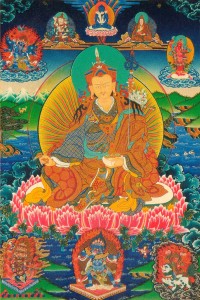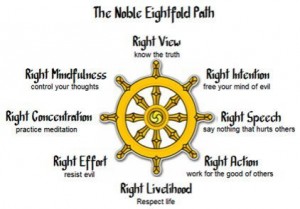The following is an excerpt from a teaching by Jetsunma Ahkon Lhamo called “Faults of Cyclic Existence”
I am grateful to those who go through the Sunday prayers without having the foggiest idea what they mean. I commend you completely with all my heart and soul, if I had one. (That is a joke. You see according to the Buddhist philosophy there is no such thing as a soul.) It is considered that there are three objects of refuge: the Buddha, the Dharma, and the Sangha. The Buddha, of course, is the enlightened mind. The Dharma is the speech or teaching of the Buddha, the path of the Buddha; and the Sangha is considered to be the religious or spiritual community that propagates the Dharma, that brings about a way for us to practice. And these being our objects of refuge, we consider that all of the teaching and all of the opportunity that we have to practice actually comes from the Buddha, the Dharma, and the Sangha. So we feel that before beginning any practice it is good to make offerings. And when reciting these prayers, once you understand what the prayers are about, you can visualize certain offerings.
It is considered that it is good to request the Buddha to turn the wheel of the Dharma, or to continue to offer the path of the Dharma. It is a combination of offering and request, honoring and praising. It is our custom to do these things before we actually begin to accomplish a practice or hear a teaching. Some of the meanings of the prayers are pretty evident when you read them. Yet, you must understand that almost everything that exists on the Vajrayana path seems to exist on three levels of meaning. I am not sure why it happened that way. I think that it is just a propensity for secrecy, or drama, or something wonderful like that. It appeals to me very much.
At any rate, I think that what is addressed here are different levels of understanding. There is a preliminary level of understanding in which one first approaches the path and, almost like walking into a room, you need to figure out where the door is, how to turn the handle. We have to turn on the light; we have to figure out where the table is so that we don’t bump into it. It’s that kind of thing. We have to look at the bones of it, or the structure of it, and the inner and secret levels of meaning. One actually develops a capability for understanding as practice begins. Almost never, at least traditionally, are deeper, very mystical teachings given right at the onset of engaging in Dharma practice because it is considered that the mind needs to be deepened and gentled. At the point when that process begins through the use of preliminary practice, then additional teachings, intermediate teachings, and then ultimately the deepest teachings are givenThere are some lamas that deviate from that for their own reasons. But it is considered, from the traditional point of view, that you can give the deepest teachings to someone, but if their minds are not prepared for it they will not really accomplish the deepest teachings until they go through a period of preliminary practice and preparation. And I, for one, feel very strongly that that is the case.
Copyright © Jetsunma Ahkon Norbu Lhamo All rights reserved

